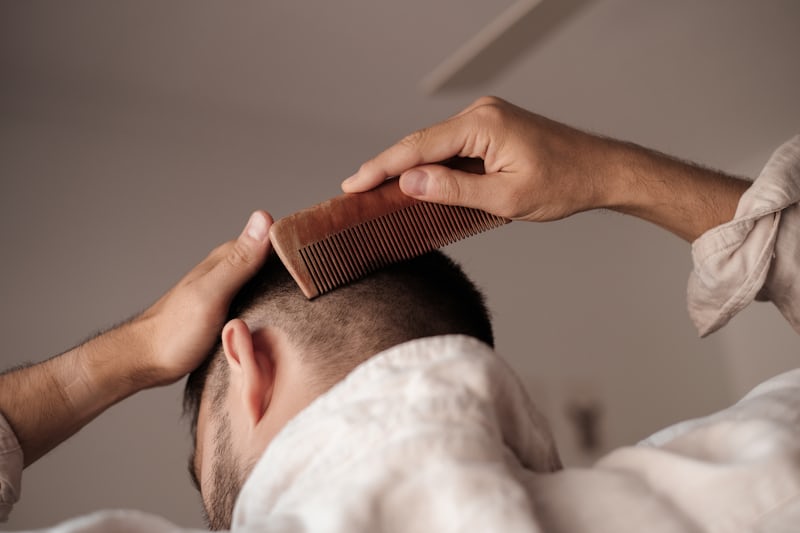Hair loss is a common issue that affects men of all ages. It can result from genetics, stress, poor nutrition, hormonal imbalances, or lifestyle factors. While medical treatments are available, many men prefer natural home remedies and lifestyle changes to manage hair loss. This guide explores effective strategies to strengthen hair, promote growth, and prevent further loss, all from the comfort of your home.
Understanding Hair Loss in Men
Hair loss, or alopecia, can occur gradually or suddenly. Common types in men include:
- Androgenetic Alopecia: Also known as male pattern baldness, often hereditary.
- Telogen Effluvium: Hair thinning due to stress, illness, or medication.
- Alopecia Areata: Sudden hair loss in patches, possibly linked to autoimmune issues.
- Scalp Infections: Fungal infections like ringworm can cause hair shedding.
Signs You Need Hair Care at Home
- Excessive hair shedding during washing or brushing
- Thinning hair on the scalp, temples, or crown
- Dry, brittle, or weak hair strands
- Receding hairline
- Itchy or flaky scalp
Home Treatments to Reduce Hair Loss
1. Proper Nutrition
Healthy hair starts from within. A balanced diet provides essential vitamins and minerals for hair growth.
- Protein: Eggs, fish, chicken, legumes, and nuts strengthen hair.
- Iron: Spinach, lentils, and red meat prevent hair thinning.
- Zinc: Pumpkin seeds, nuts, and seafood improve hair follicle health.
- Vitamin C: Citrus fruits and berries enhance iron absorption and promote growth.
- Omega-3 Fatty Acids: Fish, walnuts, and flaxseeds support scalp health.
2. Scalp Massage
Massaging the scalp increases blood circulation, which nourishes hair follicles and stimulates growth.
- Use fingertips to gently massage the scalp for 5–10 minutes daily.
- Apply natural oils like coconut, castor, or argan oil during massage.
- Regular massage improves hair thickness and reduces stress-related hair loss.
3. Essential Oils for Hair Growth
Essential oils can strengthen hair, reduce dandruff, and promote growth.
- Rosemary Oil: Stimulates follicles and improves circulation.
- Peppermint Oil: Invigorates the scalp and promotes hair growth.
- Lavender Oil: Improves hair density and reduces stress.
- Mix a few drops with a carrier oil and massage into the scalp 2–3 times a week.
4. Aloe Vera
Aloe vera soothes the scalp, reduces dandruff, and promotes hair strength.
- Apply fresh aloe gel directly to the scalp for 30–60 minutes before washing.
- Use 2–3 times per week for best results.
- Reduces inflammation and strengthens hair follicles naturally.
5. Onion Juice
Onion juice contains sulfur, which improves blood circulation and stimulates hair growth.
- Grate an onion and extract its juice.
- Apply to the scalp for 20–30 minutes, then rinse with mild shampoo.
- Use 1–2 times per week to see improvement.
6. Green Tea
Green tea is rich in antioxidants that can prevent hair loss and promote growth.
- Brew green tea, let it cool, and rinse your scalp with it 2–3 times per week.
- Contains polyphenols that stimulate hair follicles.
- Regular use can reduce hair thinning and strengthen strands.
7. Healthy Hair Habits
- Avoid excessive heat styling and harsh chemicals.
- Use a mild, sulfate-free shampoo and conditioner.
- Brush gently to prevent breakage.
- Avoid tight hairstyles that pull on hair roots.
- Protect hair from sun damage with hats or protective products.
8. Stay Hydrated
Proper hydration supports healthy hair growth and prevents dryness.
- Drink at least 8–10 glasses of water daily.
- Include water-rich foods like fruits and vegetables.
- Hydration improves scalp health and reduces dandruff.
9. Stress Management
Stress is a major factor in hair loss, particularly telogen effluvium.
- Practice meditation, deep breathing, or yoga.
- Engage in hobbies, sports, or physical activity to reduce stress.
- Consistent stress management improves hair retention and overall health.
10. Regular Exercise
Exercise improves blood circulation, oxygen delivery, and nutrient transport to hair follicles.
- Include cardio and strength training exercises 3–5 times per week.
- Improves hormone balance, reducing hair loss caused by imbalances.
- Light stretching and yoga can also help improve scalp health.
Sample Hair Care Routine at Home
Morning
- Drink a glass of water with lemon
- Gentle scalp massage with a few drops of coconut oil
- Eat a protein-rich breakfast with eggs, nuts, or oatmeal
Midday
- Stay hydrated with water or herbal tea
- Include iron-rich foods like spinach or lentils in lunch
Evening
- Apply aloe vera or onion juice to the scalp 2–3 times per week
- Massage scalp gently for 5–10 minutes
- Rinse with mild shampoo
Night
- Avoid tight hairstyles while sleeping
- Sleep on a silk or satin pillowcase to reduce friction
- Practice relaxation techniques to lower stress
When to See a Doctor
While home treatments are effective for most cases, consult a doctor if:
- Hair loss is sudden or patchy
- There is scalp irritation, redness, or pain
- Hair loss is accompanied by other health issues
- Family history of severe baldness or hormonal disorders
- Home remedies do not show results after several months
Final Thoughts
Hair loss in men can be managed effectively at home with natural remedies, a healthy diet, and proper hair care habits. Incorporating nutrient-rich foods, scalp massages, essential oils, and stress management techniques can strengthen hair, promote growth, and prevent further loss. Patience and consistency are key, as natural treatments may take several weeks to show visible results. By following these strategies, men can enjoy healthier, stronger hair and boost confidence naturally.


